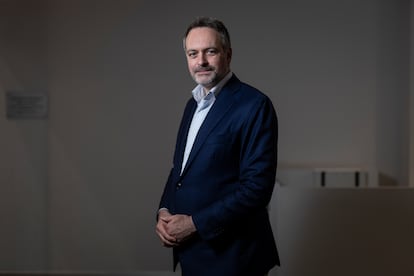René Repasi, German MEP: ‘We suddenly realized that we are incapable of defending ourselves’
The head of the Social Democratic delegation in Brussels and negotiator of the coalition agreement with the Christian Democrats reflects on the shock that Europe has experienced from realizing it cannot trust the US


Europe is at a crucial moment in its history, at a crossroads that goes beyond the transatlantic relationship. The underlying challenge is the “revolution” of the far right, which seeks to shatter the established order to create another based on the survival of the fittest. “We are the last torch before the approaching darkness,” says René Repasi, 45, head of the German Social Democratic delegation in the European Parliament. On a quick visit to Barcelona to participate in a meeting on the authoritarian threat in Europe organized last week by the Socialist Party of Catalonia (PSC), he spoke to EL PAÍS during the time left by negotiations to form the next coalition government in Germany.
Forming a stable government is more than ever “a necessity,” he underscores. There is no other alternative to maintain the firewall around the far right. “A century ago, conservatives thought they could tame the far right, but we know how that ended. That doesn’t mean that where these two forces cooperate it will end in a Third World War, but Germans are very sensitive to this matter and expect a sense of responsibility from democratic parties.”
The coalition negotiations are proceeding much more secretively than when the three-way coalition of Social Democrats, Greens, and Liberals was formed in 2021. Back then, leaks, stolen photos in the early hours of the morning, and even smiling selfies of the protagonists abounded. In 2025, with a war on European soil just a two-hour flight from Berlin and the shock of Donald Trump’s return to the White House, “the scenario is different,” says Repasi, who is also a law professor at Erasmus University Rotterdam. A darker one, with “multiple crises to manage.” “The challenges for Germany are so extreme that we have cast aside taboos like the debt brake and fiscal rigor in record time,” he asserts.
The winner of the February elections and likely next chancellor, Friedrich Merz, pushed through the Bundestag last week his multi-billion-dollar investment plan for defense and infrastructure. With the support of the Social Democrats and Greens, he put an end to the budgetary rigor that has dominated German politics in recent years as it re-arms against the Russian threat and the U.S. shift. Trump’s policies have sent shockwaves through Europe, but have particularly shaken Berlin. At first, says Repasi, “many of the people who supported the far right in Germany also cheered Trump, the disruptor, the far-right revolutionary.”
But one event in particular has marked a before and after. “There was a change in the population after the infamous Oval Office meeting with Zelenskiy. It touched a very sensitive spot deep in the German soul: the fear that there could really be another war,” says Repasi, who describes how the treatment of the Ukrainian president at that meeting, in which Trump and his vice president, J. D. Vance, tried to humiliate him, has made Germans acutely aware that what had been taken for granted for the past 80 years has vanished. “We have realized that the partner across the Atlantic is no longer really a friend and that we cannot trust it. The main deterrent to a Russian attack has disappeared.” Fear has taken hold in Germany. “We have suddenly realized that we are not capable of defending ourselves.”
It is this fear, coupled with the political tradition of pacts and cooperation, that has allowed Berlin to make a U-turn in its security and defense policy without Merz even being chancellor yet, and with a caretaker government in charge. Repasi admits to a certain frustration at this shift among the Christian Democrats, who promised exactly the opposite during their campaign. “The current caretaker government imploded over €2 billion and support for Ukraine versus social spending. The Greens and Social Democrats had been insisting for years that investments were needed, which required changing the Constitution and a two-thirds majority, which necessitated the cooperation of the Christian Democrats. They, for short-sighted strategic reasons, wanted the government to fail and never supported us, and as soon as they were able to take office, they changed their minds.”
The Social Democrats have turned the page after their election defeat and are preparing to become the junior partner in the next grand coalition. From there, they will ensure that the billions that will begin to flow are spent wisely. “We have to be very cautious with the additional funds,” said Repasi, who participated last Friday in an event titled “More Europe: Defending Democracy and Security Against the Authoritarian Threat.” “Whatever we do, we need the United Kingdom,” he stated at that symposium, referring to Europe’s rearmament plans. This concept doesn’t appeal to some European capitals, such as Madrid, which prefer to speak of increasing the continent’s “security.”
“One of the complications we face is this philosophical debate about whether peace is achieved from a position of strength or from a position of renouncing military equipment,” acknowledges the member of the European Parliament, who understands the criticism and says he strongly sympathizes with the latter option. He himself refused to do his military service for reasons of conscience in his youth. “But I realize that the world around me doesn’t work that way. I believe we need the capacity to defend ourselves, but with strict control so that those capabilities are used defensively, not offensively,” he notes. This is what Olaf Scholz tried to do, he asserts, with his support for Ukraine: “But it wasn’t understood.”
The new order emerging under Trump —”the fall of the Berlin Wall of our generation,” in the words of fellow Socialist MEP Javi López—requires a redefinition of Germany’s role in the world. “In a way, we have to return to what we were in the 1970s. A strong Europe is in Germany’s interest. There should be no conflict between German national interests and European interests. And if there is, European interests must prevail,” he asserts. Berlin, he adds, wants to lead alongside France, Spain, and Poland, unlock political debates, and take the initiative. “To achieve this, it was necessary for Germany to lift the brakes on public spending, and we have already done so.”
Sign up for our weekly newsletter to get more English-language news coverage from EL PAÍS USA Edition
Tu suscripción se está usando en otro dispositivo
¿Quieres añadir otro usuario a tu suscripción?
Si continúas leyendo en este dispositivo, no se podrá leer en el otro.
FlechaTu suscripción se está usando en otro dispositivo y solo puedes acceder a EL PAÍS desde un dispositivo a la vez.
Si quieres compartir tu cuenta, cambia tu suscripción a la modalidad Premium, así podrás añadir otro usuario. Cada uno accederá con su propia cuenta de email, lo que os permitirá personalizar vuestra experiencia en EL PAÍS.
¿Tienes una suscripción de empresa? Accede aquí para contratar más cuentas.
En el caso de no saber quién está usando tu cuenta, te recomendamos cambiar tu contraseña aquí.
Si decides continuar compartiendo tu cuenta, este mensaje se mostrará en tu dispositivo y en el de la otra persona que está usando tu cuenta de forma indefinida, afectando a tu experiencia de lectura. Puedes consultar aquí los términos y condiciones de la suscripción digital.








































